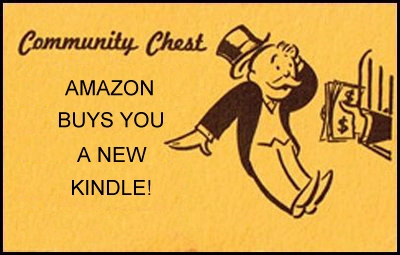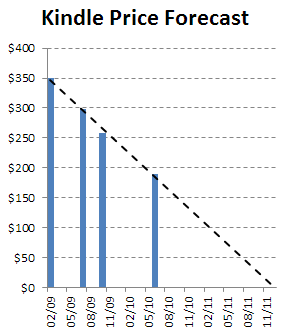
It sounds too good to be true, but some pundits are at least considering the possibility that in 9 months, Amazon will start giving away Kindles for free.
It started in October of 2009. Author John Walkenbach noted on his blog that the price of the Kindle dropped from $359 to $299 to $259 — and of course, it dropped again to $189 with the release of the Kindle 3. But Walkenbach also noticed that the Kindle’s price “was falling at a consistent rate,” observed another blog, “lowering almost on a schedule. By June 2010, the rate was so unwavering that he could easily forecast the date at which the Kindle would be free: November 2011.”

“In August, 2010 I had the chance to point it out to Jeff Bezos, CEO of Amazon. He merely smiled and said, ‘Oh, you noticed that!’ And then smiled again.”
I’d laugh this off, if it weren’t for the impressive credentials of the blogger reporting on his conversation with Jeff Bezos — Kevin Kelly. He was the co-founder of Wired magazine, and has also written for some of the most-respected publications, including The Economist, Esquire, The New York Times, and Time magazine (as well as GQ). He even was a founding board member for The WELL, one of the first online communities in 1985, well before the dawn of the big commercial internet service providers. According to Wikipedia, even the producers of The Matrix required the movie’s stars to read Kelly’s 1995 book, Out of Control: The New Biology of Machines, Social Systems, and the Economic World.
Of course, there’s a few caveats. If you go back and read the original post, Walkenbach had actually said “If this price trend continues, it will be free by June, 2011.” (And not November.) Walkenbach had added “I’m actually serious about this. At some point, the Kindle will be free. It will probably be before June, 2011.” But Friday Kelly’s site had updated Walkenbach’s graph to include the most-recent price drop to $189, and then re-calculated the trend to conclude that the Kindle’s price would reach $0 by November.
And the other caveat is more serious. 13 months ago, the TechCrunch blog reported “Amazon wants to give a free Kindle to every Amazon Prime subscriber.” That’s not particularly far-fetched, since
the program (which offers discounts on shipping from Amazon) already costs $79 a year. Amazon would throw in the Kindle for just $60 more — presumably hoping that they’d earn back the cost of the discount when the recipients started ordering more ebooks from Amazon. The previous month Amazon had even tested a unique program where they’d ship Kindles to carefully-selected customers — and the customers didn’t even have to pay Amazon. “If you don’t love it, we’ll refund your money AND you can keep the Kindle,” Amazon’s offer explained.
This all seems to suggest that Amazon has been considering a free Kindle for a while, and has even test-marketed the program (presumably to see if it’s cost-effective). But Kevin Kelly misread the date on the
coverage of that limited program, and assumed it was from February of this year — just two weeks ago — instead of February of 2010. Then he’d concluded that “It brilliantly feeds into Bezo’s long-term strategy of nurturing extreme customer satisfaction… If the past is any indication of future events, expect an as-if-free Kindle this fall in time for the holidays. Brilliant indeed!”
It’s hard to think straight about this possibility — because it’d be so ridiculously exciting if Amazon suddenly started handing out free Kindles to everybody. It does make me think that Amazon probably will continue dropping the prices on a Kindle. After all, they’ve obviously calculated how much more money they’ll earn when each new Kindle owner starts purchasing all their ebooks from Amazon’s Kindle store. I’m not a stock analyst, but it’s worth noting that the people who’ve studied the technology industry are taking this possibility seriously.
“I don’t know if this is Amazon’s plan,” Kelly wrote on his blog, “but it should be!”
I would love to get on that list. I think the Kindle concept would be a great idea for college text books and remote education. I should be sold that way.